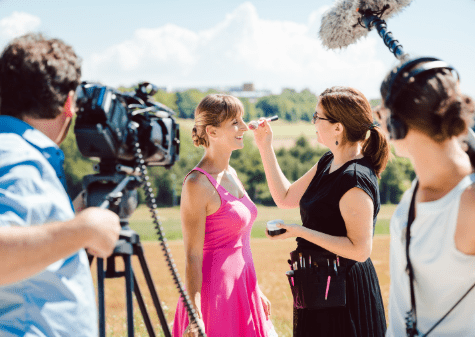How New Filmmakers Can Avoid Disasters in Audio Post-Production for Their Films and Learn From an Expert How to Do it Right the Next Time
by Carole Dean
Jerry Deaton, President of AudioKut, has spent the last five years developing his company as one of the new breeds of boutique affordable audio post-production facilities. A donor to the Roy W. Dean Grants for many years, he has mastered the sound of many of our winners and our fiscally sponsored films too. His credits span from re-recording mixer, ADR mixer dialogue editor, to sound design editor, composer, and everything in between.

“Hire those out of college because they probably have the gear, they have the time, and they’re willing to put the effort in. But, then also hire somebody who’s been doing it for a long time to come out to your location and just kind of check on them.”
Recently, Jerry decided to support filmmakers even more by teaching. He now gives classes where students sit with him and learn on their own project how to fix and mix their films. He also checks the final work if they need it. All of this is on an hourly basis.
Emerging filmmakers end up spending only a fraction of the cost for audio post and become better filmmakers in the process. He walks them through all of the technical and creative steps of the process.
I asked him to join me on my The Art of Film Funding Podcast to discuss his new class and how independent filmmakers can avoid audio mistakes that only show up when you get to post.
Choosing the Right Editing Software Can Save You Money in Audio Post-Production
Jerry said that sometimes it’s as simple as selecting the right software to save money. The software new filmmakers choose may not do what they think.
“I find first-or-second time filmmakers with small budgets are wearing several hats. They are the producer, writer, director, editor and they are expected to know each of these professions intimately. But, honestly, they don’t. They don’t know enough so they choose the wrong software.
“Let’s say they choose Final Cut Pro 10 to do their editing. It may be a cheap and easy platform to work with but, after all those countless hours they put into editing, they find that when they’re ready to go to final picture lock, they cannot get the sound off in a professional manner.
“You can’t turn it over to a post house. You will have to do it in a very archaic manner to even get the sound out. Then, it costs you much more money for the sound post house to basically re-cut that sound so that it’s workable in a post environment.”
He suggests spending just a little bit more money and investing in a program like the Adobe Creative Suites or some other platform that will allow you to export your audio in a professional manner. Just this alone will save so much time and headache down the line.
Getting Quality Sound and Saving Money for Micro Budget Filmmakers
“If an independent filmmaker is making a micro or low budget film,” Jerry suggests, “they need to be very careful in hiring a sound person. Preferably you want someone who has worked on other films.”
“However, there are a lot of filmmakers coming out of college that have been trained to do sound and in a theoretical environment. When they get out of school and they want to get their first couple of jobs to build their resume. Then often, they’ll do an independent film for free. But what you’re going to get is somebody who may be making a lot of mistakes because they’re learning on your film. And, if I was the filmmaker, the producer, the director, I would not want that situation.”
He recommends filmmakers to go ahead and hire those out of college because they probably have the gear, they have the time, and they’re willing to put the effort in. But, then also hire somebody who’s been doing it for a long time to come out to your location and just kind of check on them.
“The expert needs to be able to tell you: ‘This guy or girl knows what they’re doing, don’t worry about it.’ Or if that expert says, ‘look, from what I see, your movie’s going to be really bad,’ then that’s worth paying for. That assurance wouldn’t cost you much. That visit could be done on an hourly basis.”
But a lot of producers and directors don’t know this is a possibility until they get to post and then they find the problems they have.
”If they called me and said, ‘this is our situation, we’re getting ready to do principal shooting in three weeks. You know, we’ve hired a sound person but we’re not sure they’re really going to be able to do the job.’ I would tell them, hire somebody from my company to come out and spot check.
“If they give a sign off, you’re good to go. And then, you can bring the package to us. This way, you will not get a bunch of surprise comments like, ‘Oh, why did that mike cut out or Oh, why is your refrigerator running during your love scene?’”
Stacking Sound Files Can Be Costly and Leave the Editor Without the Best Choice
“When editors receive their sound files from the sound mixer on location, they’re usually receiving them in a stacked formation. So, let’s just say a scene a will have eight files. That is one person talking. So, it’s eight files of that one person saying one line, but on eight different mikes or eight different situations, eight different audio captures. And then what happens is, when the editors bring those eight files into their editing platform, they tend to merge all those together. And when it gets to sound post, it’s a big problem to unmerge those so that you can choose the best recorded audio piece.
“So I would tell whoever is compiling all these sound files, it’s usually the editor or editors/director, that they should learn the technology behind doing this the right way so that when it does get to sound post, it doesn’t cost them extra money.
“These problems are created because people don’t know what to do with these files, they just look at them and think, I’ll just put them all together. It’s like, no, don’t do that. They were made so you have the very best sound to choose from. That’s why they did it more than once.”
He thinks directors and editor/directors are learning a lot of their technical skills from YouTube tutorial videos. And that those are great because they do give you a lot of insight into the technology.
“But I still would tell a director/editor, hire somebody that’s been doing this for a long time. Bring them over to your editing suite and just have them walk you through how to navigate these waters. It would be probably the best, $75 or $100 an hour you’ve ever spent, and it would last them the rest of their career.”
Jerry Deaton’s Classes on Sound Recording & Editing
 Jerry’s new class evolved from all the errors he’s seen with independent filmmakers make on their films. He’s the one they call when they run into these massive problems.
Jerry’s new class evolved from all the errors he’s seen with independent filmmakers make on their films. He’s the one they call when they run into these massive problems.
“Some get into problems at a locked cut. If they’re at a lock cut, there’s nothing that can be done. It’s just repair mode. But if they call me before they’ve started filming and they need somebody to help walk them through the waters of sound, I do this for people.”
So, instead of waiting for calls from desperate filmmakers asking him to rescue them from a terrible sound issue, Jerry created his class. He charges an hourly rate and will come out to the location or talk to the filmmaker in the editing bay.
“I will say, look, do this and this, and it will help you avoid so many problems in the end. And you can either bring it to me or you can bring it to any other sound post house who will be so grateful that you did this the right way.
“Remember five years ago, everybody had a department. Everybody was an expert in their department, so editors knew how to do this. Directors knew how to direct sound. People knew how to capture location sound and prepare for sound, post. People knew how to edit and, and deal with the audio and the post-process.
“But with one person wearing so many hats, you’re getting all these gaps in knowledge. The people that are wearing all these hats should really reach out to experts in every department of filmmaking and say, look, just give me a few hours, tell me what I’m doing wrong, let me fix it and then I’ll get back to you in three months when I’m done with my edit.”
You can reach Jerry Deaton at AudioKut.com. You can send him an email at Jerry@audiokut.com or call 818 434 2601.
His vision of the new Hollywood has connected him with many like minded independent film makers and support teams. They understand big budgets do not necessarily make great films. It still takes talent, a good story and an artisan approach to technology.
Carole Dean is president and founder of From the Heart Productions; a 501(c)3 non- profit that offers the Roy W. Dean Film Grants and fiscal sponsorship for independent filmmakers. She hosts the weekly podcast, The Art of Film Funding, interviewing those involved in all aspects of indie film production. She is also the author of The Art of Film Funding, 2nd Edition: Alternative Financing Concepts. See IMDB for producing credits.
profit that offers the Roy W. Dean Film Grants and fiscal sponsorship for independent filmmakers. She hosts the weekly podcast, The Art of Film Funding, interviewing those involved in all aspects of indie film production. She is also the author of The Art of Film Funding, 2nd Edition: Alternative Financing Concepts. See IMDB for producing credits.




